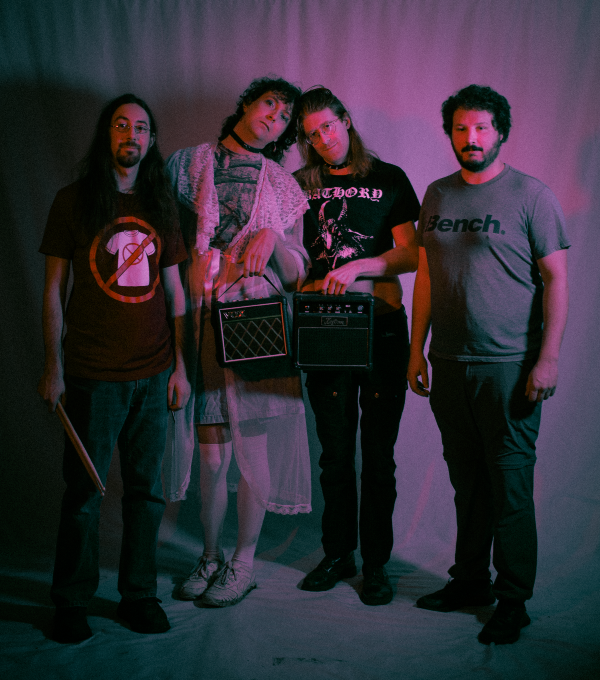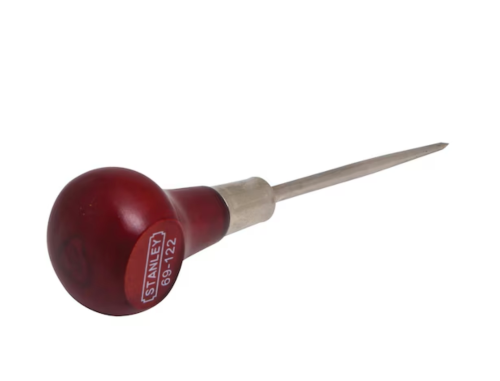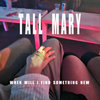Three Music Thingz with Tall Mary

Ooo la la, it's another rendition of Three Music Thingz, the blogseries where I ask musicians for three thingz that are essential to their music-making.
Today we have Tall Mary! Tall Mary is a Vancouver-based noise punk band led by Cole Klassen that just put out a behemoth debut double album called When Will I Find Something New on Kingfisher Bluez. This project is an incredibly impressive endeavor: we're talking 17 songs, some of them veering up toward the 10-minute mark, all of them infused with a breathtaking intensity and a thematic core centering around Klassen's experience coming out as trans after Covid lockdown. As she writes in the liner notes, "Many of us came out during the comfortable distance of lockdown and Zoom meetings. With the return to 'in-person' came the violent seeing, and it was like the shock of a cold lake."
Shock is right—Tall Mary's music (the lineup is rounded out with Geoff Pemberton on guitar + doing the recording/mixing/mastering, Beau Wallbridge on bass, and Hugh Conings on drums) gets the listener to experience guitar as an electric, physical force, rather than a mere musical instrument. On songs like "See Through" and "Saturday Boy," the guitar flows gracefully and then slams with brutal force, taking its sweet time across miles of musical space and often straight-up refusing to leave an uneasy, amorphous realm of dissonance, as if daring you to turn away and move on.
But there's also plenty of (slightly) more traditional punk offerings, like the let-'er-rip "Herd," which has Klassen howling a real-time meditation on the vulnerability of being a woman in public: "Walking down the street, wearing what I want / And I'm realizing something / I'm realizing something important / I'm starting to understand why women travel in packs." When Will I Find Something New is dark, dense, vivid, extremely alive, and a super exciting debut for Tall Mary.

Klassen kindly shared their three thingz with the blog and you should read them right now!!

- Newness
With an album called When Will I Find Something New, of course newness is close to our hearts. As Mark Fisher unpacks in his expansion of Franco ‘Bifo’ Berardi’s “slow cancellation of the future,” in the last two decades '80s/'90s/etc. revival music has exploded. In tandem, there are the endless franchise-throwback-extended-universes. Although all great art comes from re-approaching past ideas, there is so much art that feels re-hashed-to-death. For instance, even though I like synthwave, I’m so exhausted by synthwave that strives to sound like other synthwave, or just “like the '80s” without deeper goals.
In his book on hauntology, Mark Fisher explains hearing the Arctic Monkeys for the first time and thinking it was a re-discovered tape artifact due to its artificial “revival” vibe. When crises like climate change, genocide, and American fascism threaten to end everything, we do not imagine shiny futures. Instead, we rewind, we are haunted by the past, everything has a marketable decade-tag or throwback element (like cottagecore lol) that allows us to comfortably ignore the future.
In Tall Mary, we are deeply influenced by Japanese guitarist Masayuki Takayanagi. After hearing a noise guitar song once, he decided that his former bandmates—who loved hokey American jazz standards—were losers. He created New Direction Unit and only made difficult, forward-thinking music. Although there’s nothing wrong with being into fun music and we love pop too, we want to make people with a completely apolitical music taste feel uncomfortable. - Discomfort
My second thing is discomfort—a facet of music that I see differently in the last few years after coming out as trans. On one hand, I don’t think everyone should exhaust themselves by listening to nothing but harsh noise. Listen to what brings you joy. On the other hand, completely apolitical “comfy” music habits are convenient for the status quo because they are often spaces for dormancy and avoidance.
Before coming out, I had my start-of-college angsty edgelord music phase. Listening to nothing but stuff like Swans and Merzbow, I was like everyone is so basic omg. As I grew up, I was like woah what an arrogant incel-coded move to be so edgy; I got into pop. However, after coming out as trans and trying to spread the word about my own music, I started to value discomfort in a more measured way.
The people yelling slurs at me from their cars, the people staring at me when I dress femme, the indie dudes at the show saying my music is cringe because it’s not like Mac DeMarco—these people are all comfortable. Self-awareness and confidence is difficult even for privileged people, and their comfort attacking me is a reflection of the way they crush their own dreams and possibilities. Their response to something that is “difficult to digest” or “difficult to look at” indicates a laziness that hurts both themselves and others.
So, I am saying that privilege and habit need to be challenged. But I also think the ideas of “rest” or “self-care” can be toxic to marginalized people who genuinely need rest. I had this in mind when I wrote the song "Deer." Yes, we need to re-charge and go easier on ourselves, but will taking more baths really address the burnout? Yes take baths to relax, but if it’s the only action you take, you will keep getting burnt out as your employer and landlord leech your labour repeatedly. Marginalized people need soft spaces, but without community and action the self-care benefits no one but your boss.
As Audre Lorde notes in her essay "Poetry is not a Luxury," “Right now, I could name at least ten ideas I would have once found intolerable or incomprehensible and frightening, except as they came after dreams and poems.” If every space softens fright or discomfort, we sever ourself from our real feelings below the oppression we have endured. This is a key part of being queer: that being authentically visible to others is not uncomfortable because it is not who we are, but rather because it is who we have been taught to be. - Awls
Tall Mary’s guitarists (one tuned in E standard, one tuned lower in A standard) both play with awls. It’s like a pointy screwdriver, and it’s used most commonly for leatherwork and starting screw-holes. It’s very sharp which, beyond scratching up your guitar, make it really easy to get between strings (you can kind of slide it onto any number of strings from any angle, creating so many different sounds—unlike a slide).
I was first inspired to do this when I saw Japanese guitarist Otomo Yoshihide on Christmas day in Tokyo and the Shinkuku Pit Inn. I don’t know what he was doing, but he had some sort of metal thing he put up against the strings. I knew Sonic Youth used screwdrivers, but I had never seen something like this live.
When I was jamming with friends back in Vancouver, I started trying some different tools from my dad’s toolkit. There’s a kind of resonance in using a tool in that we write often about physical labour, but really it just sounds cool. Here is a link to our favourite modern, cheap, commercially available awl (I lost my grandpa’s old one that was even better ;_;) by Stanley.

Thank you Cole! Listen to Tall Mary's album now.
Thanks for reading I Enjoy Music! If you like it, tell a friend.





